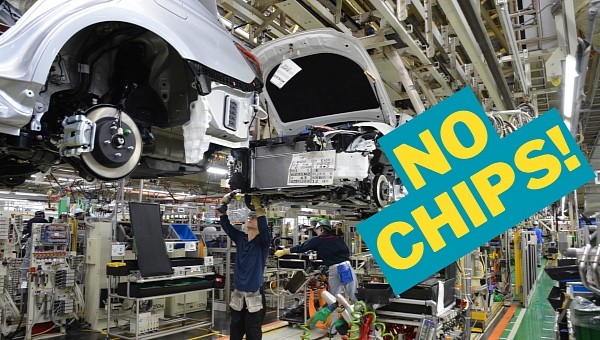The chip shortage was originally to ease off this year, but Toyota’s January sales and production numbers confirm the struggle continues.
The Japanese carmaker says sales of the Toyota brand went down 5.6 percent year-over-year in January, to about 710,000 units. Sales in the domestic market increased by 18 percent last month, while in international markets (outside Japan), the superstar brand sold 9.7 percent fewer vehicles.
Daihatsu scored a 22.6 percent global increase, while Hino went down 16.4 percent.
The company says January presented the second consecutive month of YoY decrease for the Toyota brand in terms of global sales. As far as the sales outside of Japan are concerned, they produced the first YoY decrease in 6 months.
While sales went down, production numbers were up last month. The company produced 8.8 percent more vehicles in January versus the same month a year ago. Overall, a little over 689,000 units rolled off the assembly lines wearing a Toyota badge. Hino production increased by 22.2 percent worldwide.
It’s not hard to guess why Toyota’s sales struggled in January. The company says the tight supply of semiconductors, as well as the impact of the global health crisis, continued to wreak havoc in its supply chain. As such, its production took a hit, especially as the chip inventory continues to be constrained.
Toyota emphasizes that anticipating the trajectory of the supply chain is impossible, even in the short term. The company says it’s working with suppliers specifically to minimize “sudden decreases in production,” as shipping vehicles to customers faster is a top priority.
Despite forecasts that the global chip inventory could improve in 2023, the tight supply continues to be a major concern for carmakers. More worrying is that anticipating how the inventory would evolve is also impossible, especially due to market instability, geopolitical tensions, and rising inflation.
General Motors previously warned that the chip shortage is unlikely to be over in 2023. The company’s CEO said the semiconductor crunch could even persist beyond this year, especially as investments in capacity wouldn’t come to fruition earlier than 2024.
Toyota also expects the chip supply to remain challenging throughout 2023. The company previously said that it expects its yearly production target to suffer a 10 percent decline due to constrained inventory.
Tech giant Intel also warned that the automotive industry would continue to struggle with chip problems until at least 2024. The decline recorded in PC and smartphone sales has convinced chipmakers to invest in retooling, especially as the number of chips aimed at cars is growing. The demand for the car industry remains solid, and the consensus is that automakers would become some of the largest semiconductor customers in the long term.
Daihatsu scored a 22.6 percent global increase, while Hino went down 16.4 percent.
The company says January presented the second consecutive month of YoY decrease for the Toyota brand in terms of global sales. As far as the sales outside of Japan are concerned, they produced the first YoY decrease in 6 months.
While sales went down, production numbers were up last month. The company produced 8.8 percent more vehicles in January versus the same month a year ago. Overall, a little over 689,000 units rolled off the assembly lines wearing a Toyota badge. Hino production increased by 22.2 percent worldwide.
It’s not hard to guess why Toyota’s sales struggled in January. The company says the tight supply of semiconductors, as well as the impact of the global health crisis, continued to wreak havoc in its supply chain. As such, its production took a hit, especially as the chip inventory continues to be constrained.
Toyota emphasizes that anticipating the trajectory of the supply chain is impossible, even in the short term. The company says it’s working with suppliers specifically to minimize “sudden decreases in production,” as shipping vehicles to customers faster is a top priority.
Despite forecasts that the global chip inventory could improve in 2023, the tight supply continues to be a major concern for carmakers. More worrying is that anticipating how the inventory would evolve is also impossible, especially due to market instability, geopolitical tensions, and rising inflation.
General Motors previously warned that the chip shortage is unlikely to be over in 2023. The company’s CEO said the semiconductor crunch could even persist beyond this year, especially as investments in capacity wouldn’t come to fruition earlier than 2024.
Toyota also expects the chip supply to remain challenging throughout 2023. The company previously said that it expects its yearly production target to suffer a 10 percent decline due to constrained inventory.
Tech giant Intel also warned that the automotive industry would continue to struggle with chip problems until at least 2024. The decline recorded in PC and smartphone sales has convinced chipmakers to invest in retooling, especially as the number of chips aimed at cars is growing. The demand for the car industry remains solid, and the consensus is that automakers would become some of the largest semiconductor customers in the long term.






